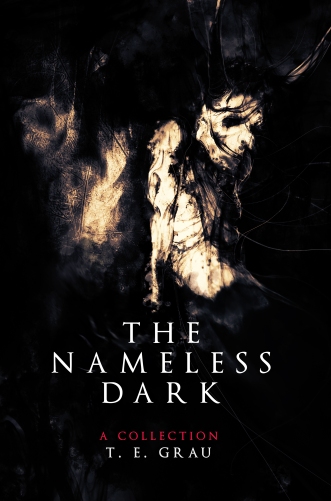
We live in a time of plenty.
In the last decade and change, the rise of small publishing houses and e-reader devices has opened up a doorway through which a veritable smorgasbord of dark fiction has poured forth into the hands of fans who might not have otherwise encountered them. But not even the accessibility or mass proliferation of grim literature can be held entirely accountable for the embarrassment of riches we have today. A similar wave passed during the Great Horror Boom of the 70s and 80s, but the current renaissance we live in now has granted us the gift of quality in addition to quantity.
This commitment to higher literary standards, along with a special devotion to the short story, has led to the releases of dozens of books in the last few years that all bear the craftsman’s seal of approval, a time when even debut collections hum with a vitality and talent that wouldn’t have been dreamt of in those bygone days of spinner rack terrors. With the unleashing of The Nameless Dark, T. E. Grau has cemented himself as an author whose byline should spark in readers a joyful expectancy for what surprises there are to follow.
Having spent his early days grinding away in the Hollywood dream machine, Grau has instilled the stories collected here with a cinematic beat and tenor. Many of them have the feel of miniature epics, stories of great change that course the classical arc and find his cast of rebels and hard-hearts attempting to desperately pick their way through life’s minefield before butting up against the high-powered electric fence of the unforgiving cosmos. Even at their bleakest—and many of the tales end badly for at least one person—Grau’s works satisfy with the rightness of their narratives, the feeling that the scales of the universe have attained their balance once more regardless of the insignificant lives that were overthrown to do so.
It’s hardly surprising then that literature in this nihilistic shade should find a comfortable niche within the Lovecraft mythos. While a number of the stories in The Nameless Dark integrate the thematic concerns or explicitly name-check sites of interest from Lovecraft’s body of work, Grau is an author who, like Ramsey Campbell before him, has carved his own distinct identity from the clay of the Miskatonic. Discontent to write mere pastiche, Grau brings fresh perspective to the Great Old Ones by framing them in a variety of lenses for us, each one adding a different note of clarity or understanding.
“The Screamer,” one of the book’s finest tales, takes us from the haunted hills of New England to the urban sprawl and office drone of Century City, California, a haven for lawyers and pristine skyscrapers that becomes invaded by the sonic madness of an interdimensional creature. It’s a tantalizing mystery that Grau cleverly baits us with, taking us from the painful futility of the protagonist’s existence to a climax of apocalyptic proportions that is all handled with the finesse of an old pro. “Twinkle, Twinkle” and “Return of the Prodigy” use the emotional bonds of love and family to accent the impending intervention of dark forces. In the former, a father grieving his wife’s death tries to save face for the sake of his daughter, a precocious girl who’s recently developed a keen interest in astronomy, while the latter presents us with a middle-aged couple attempting to overcome their marital frustrations Tracy-Hepburn style and reignite the flame by taking a second honeymoon in the South Pacific. While love and compassion can act as a salve to life’s scars, Grau shows us that their healing powers can only ever be temporary in the face of incomprehensible terror. We can be the kindest parents and most thoughtful lovers in the world, but to the howling abyss we will always remain mulch.
A certain strain of machismo runs through the other Mythos-influenced tales. “Free Fireworks” and “White Feather” both describe male war “heroes” living under a cloud of fear, one from the looming threat of religious radicals and the other from the shame an act of cowardice during battle has garnered him from the citizens of his home village. “Free Fireworks” underlines the blindness of fanatical devotion to one’s country or belief system, the ease with which we view any faith or people different than ourselves as that reviled Other, destroyer of hearth, home, and honor. “Free Fireworks” may feel as if it is in the service of its “twist” ending, but those who know how foreign peoples have been demoted into sub-humans by our government will feel the chill of all-too-real parallels long before the tale’s end.
The folk adventure tone of “White Feather” is also present in “The Mission,” the jerky-tough Western novella that rounds out the collection. Here it feels as if Grau has truly utilized the celestial landscape of Lovecraft to his own ends, an address on the racial and historical borders that both unite and separate us as a people, for better or worse. Mostly worse. The message doesn’t click quite as seamlessly as one would hope, but that is perhaps most fitting for the subject: it’s a matter of differences for which the only easy answer there can ever be is total annihilation. Which just so happens to be the answer we prefer more times than not, as the band of bounty hunters running foul of their Native American targets soon discover when plumbing the depths of the tribe’s ancient religion and coming face to face with the darkness of their own sins.
The disillusioned male gets his due in a trio of literary blood brothers. “Transmission” bears the markings of Grau’s first foray into fiction, an effective build-up concerning a disaffected hipster runaway tuning into sinister radio broadcasts in the desert twilight that becomes slightly mired in the cyclical nature of the faceless broadcaster’s monologue. The author proves even better at conjuring images of disturbing potency in “Love Songs from the Hydrogen Jukebox.” Here Grau combines his fascination with the Beat scene of the 50s with inspiration from the carnivorous cosmos of modern grandmaster Laird Barron, resulting in a story about a social transient making his way through the vista-expanding world of recreational drugs to a whole new level of eye-opening with his indoctrination into a cult following the prophecies of Old Leech himself. A reckoning of sorts also occurs to the lead of “Expat.” Ghost story aficionados might sense the plot’s trajectory—I, for one, was surprised—but Grau’s command of the off-kilter and darkly humorous shines through in this surreal little locked-room mystery.
Further down the chronological scale: a pair of tales concerning children, both of them accomplished in their own right. “Clean” is brief, quietly brutal, subtle for the way Grau softly sidesteps divulging the exact nature of the weirdness at the heart of it, and utterly disturbing in the way it paints child predators in a clear, unflinching tone. Pedophiles loom in the periphery of “Tubby’s Big Swim,” just another in a long line of tortures and disappointments in the life of our boy hero, Alden. Alden loves animals of all kinds, though he can never seem to keep one alive. (Alden thought cats always landed on their feet. This one sure as heck didn’t. City cats must live by different rules.) Alden seems to find his match in Tubby, a pumpkin-hued octopus he rescues from a shady pet shop that then proceeds to make all the problems in his life disappear. An original tale to the collection, “Tubby’s Big Swim” finds Grau conducting a symphony of emotional notes: achingly sad, unexpectedly funny, and genuinely heartfelt, it speaks to the inner misfits within us all who as children wanted nothing more than to send our faithful animal sidekicks before us to destroy the whole stupid world for all the wrongs it did us.
The remaining three entries in the collection display Grau’s penchant and talent for migrating from one diverse narrative to the next. “The Truffle Pig” is a black journal entry encapsulating the existence of none other than Saucy Jack of Whitechapel, an engagingly creative riff on history and fiction that binds both together with a gory thread. “Beer & Worms” is as succinct and surly as its title would imply, a fishing tale that doesn’t take long to set its homicidal hooks in you. Then there’s “Mr. Lupus,” Grau’s unabashedly fun turn at world-building, a Burtonesque Grimm Brothers musical of Yuletide cheer that adds a dash of lycanthropy to sweeten its overflowing pot of charms.
The Nameless Dark is an impressive collection by any standard, but to carry the knowledge that it holds within its pages Grau’s very first fictional experimentations can’t help but leave one wondering what great things we have yet to see flow from his pen, be they however black and bloody. A writer of his chameleonic skill is one to watch for, and though his stories may transform and change shape over time, his will be a name that you can always rely on.
Jose Cruz is the editor-in-chief of The Haunted Omnibus. He lives in southwest Florida with his wife, their very furry child, and a decent amount of books.

Damn, Jose, you really know how to make a book feel special. Thanks so much for this detailed, insightful review. One of the best explorations of The Nameless Dark that it has ever received.
LikeLiked by 1 person
Great review of a great collection – we’re lucky to have this book in the world.
LikeLiked by 1 person
Thanks much, Ray. I’m honored by your blurb for the collection.
LikeLike